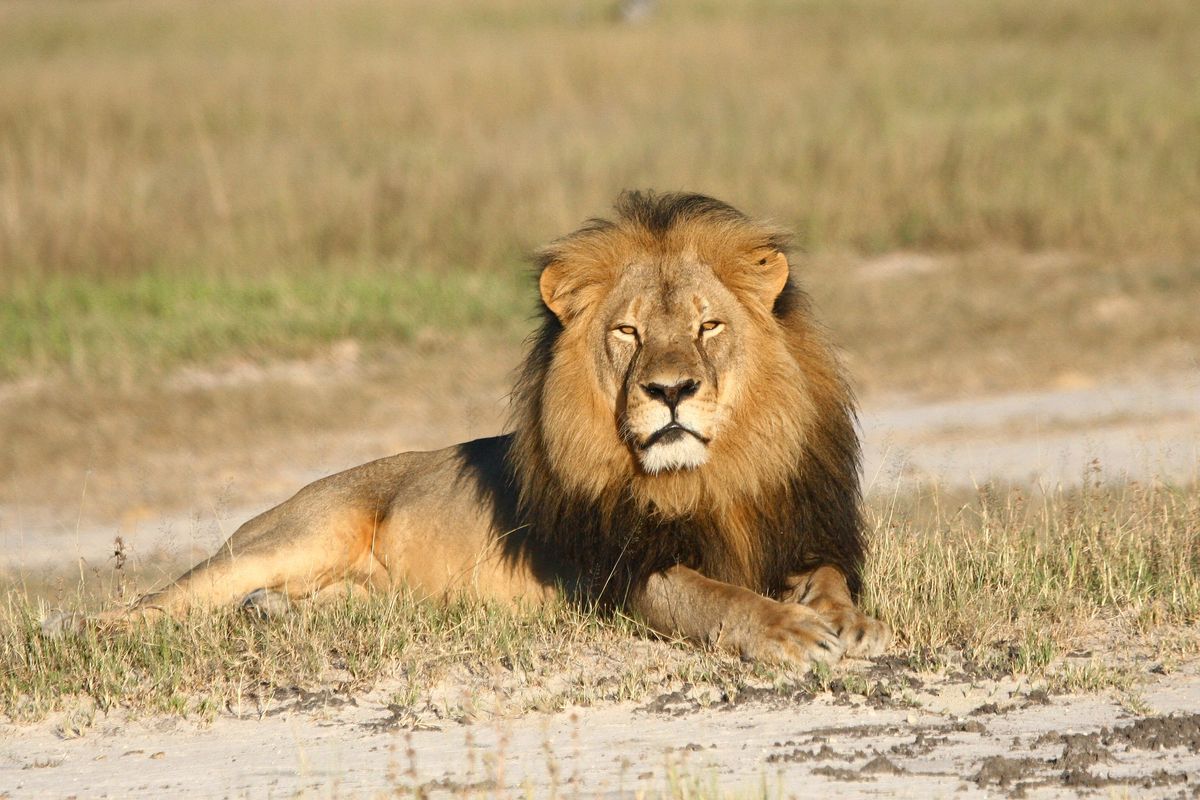Hunter ethics count nowadays under unblinking public eye
This African lion was lured from a preserve and killed by a hunter. (Associated Press)
The public is numb to kids being killed in Syria.
Mouths water as a sultry TV model opens her mouth wide like a whale around a monster beef burger.
Viewers giggle when grinning weathercaster Tom Sherry grills a formerly cute chicken on the grill outside the KREM studio.
Photos of anglers proudly holding big fish are so universally accepted in our culture they’re often selected to honor a loved one in a published obituary.
Yet an archer’s silent arrow aimed at an African lion is a shot heard around the world.
The impact of Walter Palmer’s broadhead into a tourist- attraction lion known as Cecil smacked the social and mainstream media so shockingly loud last week that hunters themselves have become prey to an international witch hunt.
The Minnesota dentist has chosen to spend his fortune in the quest of killing and collecting trophy game. In this case, he reportedly paid $55,000 to Zimbabwe guides who baited a 13-year-old lion known to tourists as Cecil out of a protected reserve. They reportedly dragged meat behind a vehicle to lure the lion to the hunter’s stand.
This sort of unethical trophy hunting isn’t necessarily condemned in Zimbabwe, but it’s like a windfall for PETA and other anti-hunting groups.
I’m a life-long hunter and proud of it. I’ll match the positive economic and conservation impacts of sport hunting any day to the comparatively feeble gestures of grand-standing anti-hunting groups.
I hunt for meat and the nature-observing intensity promoted by the pursuit of game. Most big-game hunters spend days and weeks in the field for the opportunity to take a shot. Less than 10 percent of Washington elk hunters even get that chance.
I don’t consider myself a trophy hunter, although I have a huge mounted bull caribou hanging in the entry of our house. It brings back memories of a butt-kicking hunt, miles of slogging through tundra and a chilling encounter with an Alaska grizzly bear.
While I don’t have the money or the interest to regularly stalk and stuff trophy game, I see no reason to condemn hunters who do as long as they pursue game legally and ethically.
Parker and his outfitter apparently violated both of those conditions, so let the criticism fly.
But when the dust settles, sportsmen will have to redouble their effort to educate the world about the critical role hunting plays in wildlife conservation.
Poaching and corruption are rampant in nations holding rare wildlife. Regulated hunting brings in revenue to local landowners and communities and gives status to game – a reason to tolerate impacts to private property and to protect wildlife from poachers.
Wealthy people have contributed significantly to wildlife management funding, albeit sometimes because of their vanity. Paul Allen takes credit for his philanthropy, too. Thanks! And more power to him.
Of course, being rich doesn’t necessarily make a hunter wise or respectable. Thanks for reminding us, Mr. Palmer.
Anti-hunting groups and national TV media are taking the leap from the Zimbabwe lion hunt to make a big deal about an Idaho State University staffer who has posed with several African trophies she’s killed, including a giraffe. They’re making a big deal about posting a hero-shot with the giraffe as though the long-necked animal should be protected in some way that a white-tailed deer is not.
They can’t belittle the hunter for proving his manhood in this case because she’s a woman. So they’re just inferring that giraffes are too stately to be killed. I have no desire to shoot one, but who cares?
The morality argument doesn’t fly. That woman has killed fewer animals in her lifetime than Arby’s slaughters in a minute.
A woman wearing ivory jewelry or a hostess with ivory art is far more disgusting than a hunter who legally shoots a giraffe.
What’s more sickening: a hunter posing with a tagged kill or a tourist selfie while hand-feeding bears or mountain goats?
The shooting of Cecil, the semi-tame lion, likely will have impacts even here in Washington.
Palmer has focused the public’s attention on baiting big game. That’s an issue Washington Fish and Wildlife officials tried to confront in the past two years only to be postponed for more study by the Fish and Wildlife Commission.
Washington allows hunters to lure deer and elk with apples and other food (and salt outside of federal land) while most states, including regulation-wary Idaho and Wyoming, prohibit most big-game baiting.
The public looks at baiting as unethical even though a lot of hunters, especially archers, have rationalized it as business as usual.
Baiting will be hard to justify under the public spotlight.
Unfortunately, trophy hunting groups often smugly distance themselves from engaging the public. Locally, some hunting and shooting groups snubbed even The Spokesman-Review’s long-standing support and coverage years ago after I wrote columns challenging the Bush Administration and the NRA for policies that were dividing sportsmen on conservation issues.
It’s hard to imagine getting the cold shoulder for suggesting that sportsmen could benefit by finding common ground on measures such as preserving and improving wildlife habitat.
That’s fine with me. I can live with the fact that I was right.
But while hunters can criticize and turn their backs on mainstream media, they’re outgunned in the new age of social media.
The recoil from the African lion case sparked pressure via the Internet that prompted airlines to make hasty poor decisions on banning transport of some legally hunted African game.
I’ve actually been criticized by some hunters for regularly working hunter ethics into my coverage of the sport. Let me turn the other cheek.
The way hunters conduct themselves in the field counts. The way they portray themselves in social media nowadays has changed the game.
Anti-hunters and the gullibles they court don’t care if you turn a cold shoulder to Facebook. They’ll just shoot you in the back and carry on.
Contact Rich Landers at (509) 459-5508 or email richl@spokesman.com.

